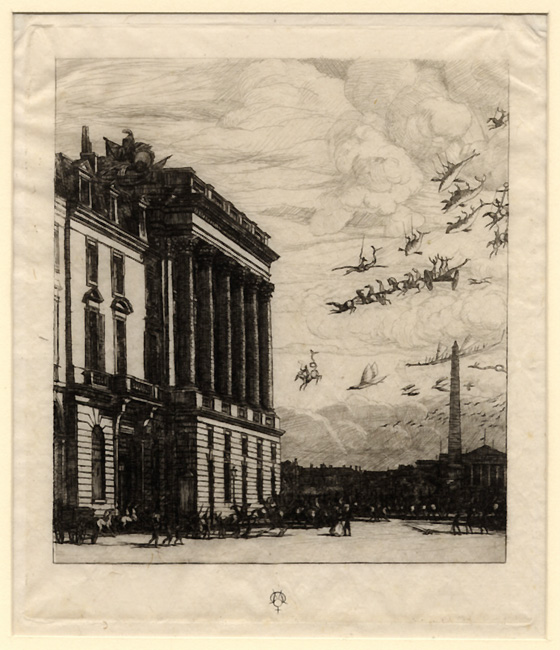Bizarre
- Lepic, Ce qui Restait du Puissant Guillaume de Naillac
- Claeaz, Dancers with Death
- Anonymous American, A Naked Man and Horse
- Klinger, Amor, Tod und Jenseits (Love, Death and the Hereafter)
- Surugue, La Folie pare la Décrépitude
- Legros, La Légende du Bonhomme Misère : La Mort dans le Poirier
- Rops, L’Enlèvement
- Sadeler, Allegory of Opulence, Fornication and Stupidity
- Mohlitz, La Vierge aux Étrons (The Virgin of Turds)
- Legrand, Épaves de Famille (Oddballs of the Family)
- Jacquemart, L’Écurueil (sic)
- Benassit, L’Absinthe!
- de Bry, Punishment of the Mutinous Indians
- Goncourt, Le Singe au Miroir (The Monkey at the Mirror)
- Callot, Les Martyrs du Japon
- Dillon, Les Mendiants (The Beggars)
- Barberis, The Witch
- Budzinski, The Thirsty Giant
- Meryon, Le Ministère de la Marine
- Torre-Bueno, Death’s Arrival
- van Meurs, Animals of America
- Redon, Félinerie
- Chagall, Le Vixe
- Martin, Indécision (Tête de Femme)
- Rops, Le Calvaire
- Rops, Les Frères de la Bonne Trogne
- Gillray, Tentanda via est qua ve quoque possim Tollere humo
- Underwood, Simian Ecstasy
- Veber, Beheaded!
- Strang, Death and the Ploughman’s Wife: Frontispiece
- Corman, The Temptation of Saint Anthony
- Bliss, Gargoyles Spouting
- Castellón, Of Land and Sea
- Eichenberg, Isaiah 11
- Rops, L’Idole (The Idol)
- Master MZ, Aristotle and Phyllis
- Bracquemond, “Hors de mon soleil, canailles!"
- Spare, Nemesis
- Higgens, Forgotten
- Anonymous, Jewish Amulet to Protect Mother and Child
- Daumier, Une Expérience Qui Réussit Trop Bien
- Seligmann, Le Roi du Charbon (King Charcoal)
- Braun, The Release of Force
- Callot, Le Grand Rocher
- Forest, Bâstard Foetus Hérédité, Comte D’Averton Mort-Né
- Jacque, La Souricière
- Veber, “Ah! Qu’il fait chaud"
- Pastelot, Les Sorcières
- Lepic, Le Verger du Roi Louis (The Orchard of King Louis)
- Grandville, Résurrection de la Censure
- Tidemann, The Earth Swallows Up the People of Korah
- Shields, The Descent
- Redon, C’est le diable
- Sadeler, Ita Erit et Aventus Filii Hominis
Le Ministère de la Marine
Etching, 1865, from Eaux-Fortes sur Paris, 166 x 142 mm., Delteil/Wright 45 v/vii. Fine, dark impression, before the title, on white, laid chine volant with good margins; a few soft creases from previous mounting. Perhaps only Meryon, having decided to etch an image of what was then the huge Marine Ministry building, would choose to go around the corner and etch only the far end of it. Certainly only Meryon, in etching such an image, would decide to populate the sky with fantastic sea creatures, spearmen, horse-drawn chariots and the like. This was well before the age of Surrealism. He probably saw those things in the sky with his own two eyes, as well as he saw the buildings and the people on the ground, and, clearly, the man was mad. But we knew that already. We also know that he was one of the greatest etchers in history and when you see one of his prints, preferably in an impression before the mass-printed published edition, it speaks to you.
![]()
